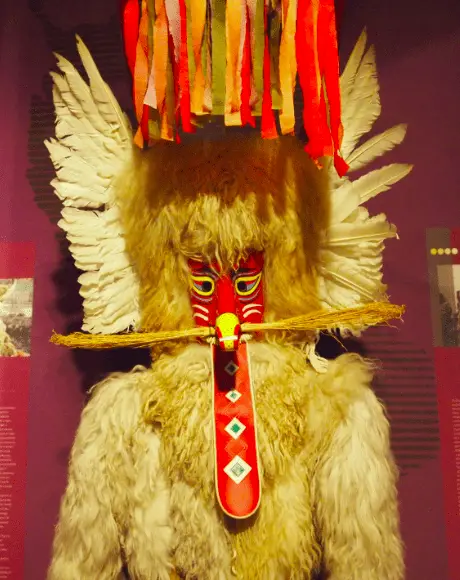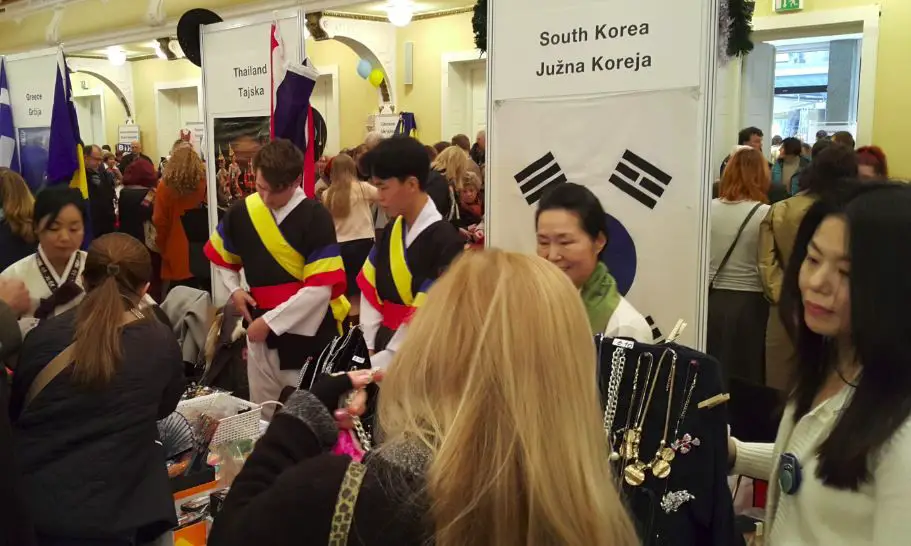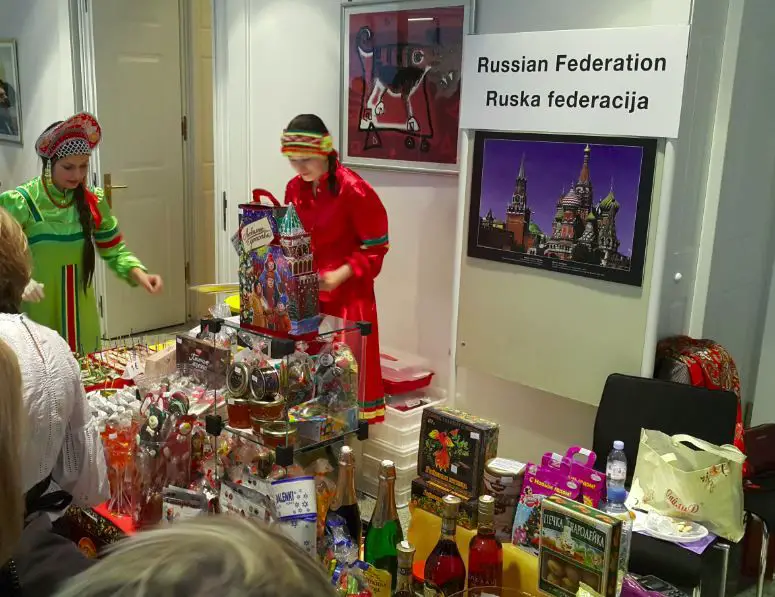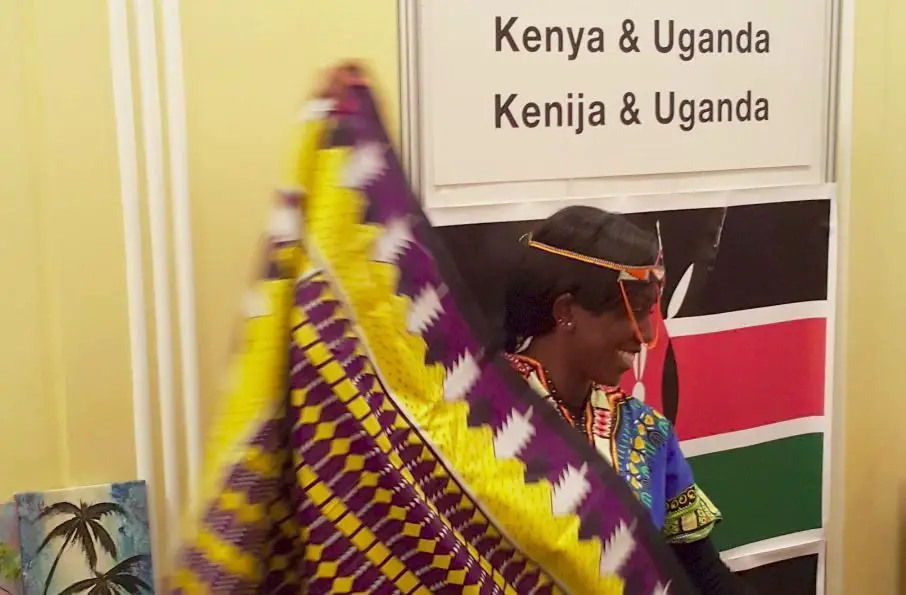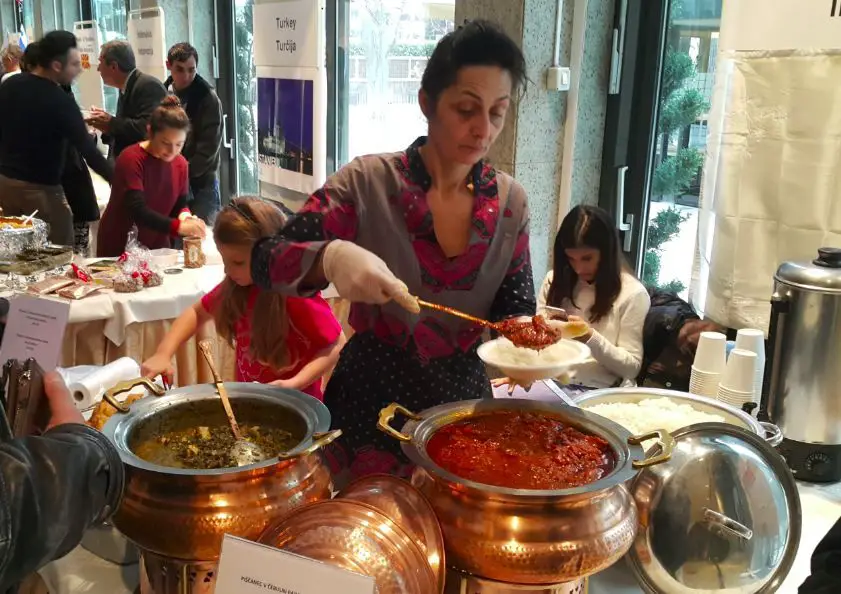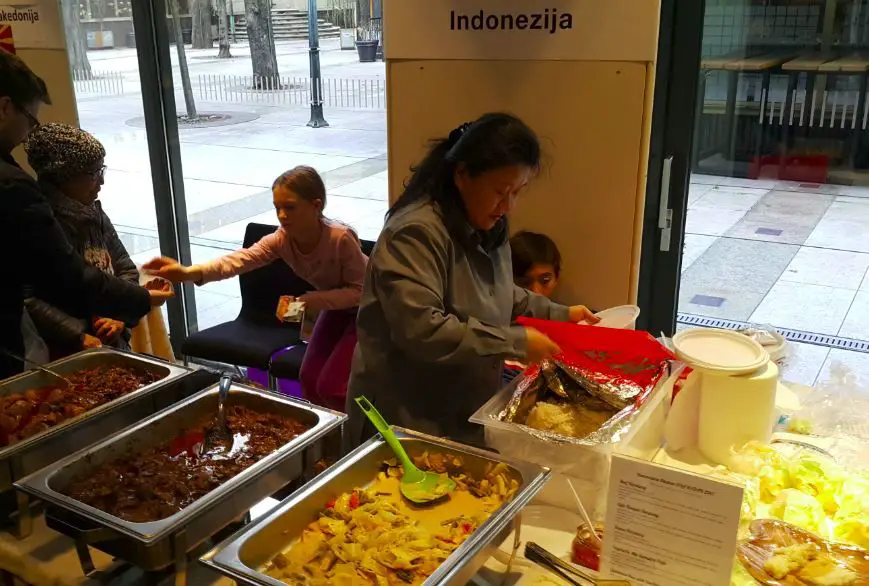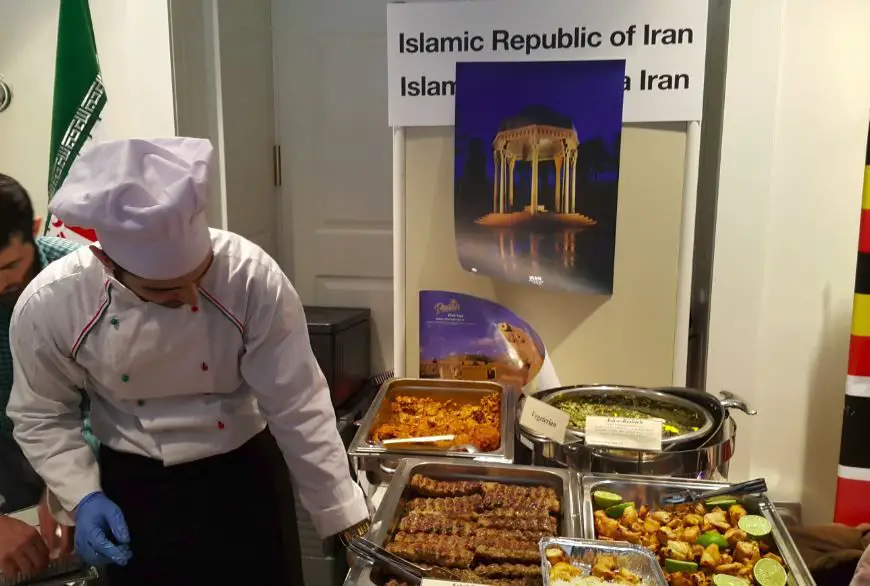News
STA, 27 November 2018 - MPs failed to pass in a re-vote on Tuesday a reform bill on real estate agencies which was to improve the legal certainty of consumers as well as realtors. The upper chamber vetoed the motion in March, claiming that it excessively regulated the field.
While today's vote ended 42:10 in favour of the bill, absolute majority of 46 out of 90 MPs would have been needed in the re-vote.
Only four of the five coalition parties supported the bill, while the Alenka Bratušek Party (SAB) did not present its view.
The Marjan Šarec List (LMŠ), SocDems, Pensioners Party (DeSUS) and the Modern Centre Party (SMC) said that the bill would protect consumers and provide for the legal safety of all stakeholders on the real estate market.
But the opposition parties New Slovenia (NSi) and the National Party (SNS) agreed with the objections to the bill voiced by real estate agencies, who argued that the bill would restrain agencies too much.
In contrast, the opposition Left opposed it for allegedly not bringing enough regulation.
All our real estate in Slovenia stories are here
The opposition Democrats (SDS) did not present its arguments.
The National Council, the upper chamber of parliament, vetoed the bill in March at the initiative of a group of councillors led by Mitja Gorenšček, the executive director of the Chamber of Commerce and Industry (GZS).
The bill was initiated by the GZS's real estate agencies section but after it was amended at parliamentary committee level, the group turned against it, saying that it envisaged excessive regulation by capping the provision in real estate deals with individuals at 4% (which is in line with the existing law), by limiting provisions in rental deals to one-month's rent and by setting the maximum costs in case of no deal at EUR 150.
November 29, 2018
As has been reported on many other occasions, there are “three good men” that bring gifts in Slovenia in December.
These papa Smurf clones arose from attempts by various ethico-political systems to erase the “barbaric” pagan rituals that have taken place during the Winter Solstice since pre-history, and after failing to get rid of them they were adopted and restyled in the image of the dominant “religion”, assuming various roles to meet the political demands of the day.
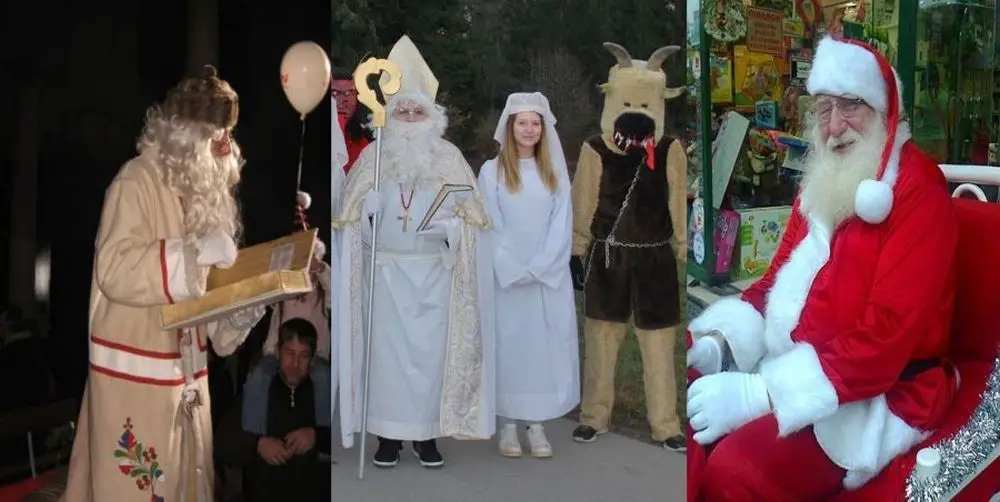
Currently in Slovenia, St. Nicholas (Miklavž), who brings gifts to children on the Eve of December 6, and Grandpa Frost (Dedek Mraz), who brings them on New Year's Eve, are in increasing competition with each other as much as they are with Santa Claus. Božiček, or the Little God, contrary to expectations, is in fact the one most closely associated with Slavic pagan celebrations of the Winter Solstice, one of the two most important pagan holidays, with this being one possible explanation as to how and why the birth of Jesus was chosen to be celebrated around this particular time.
So the first one to arrive, St. Nicholas, is a saint, known for his good deeds, also a protector of sailors and fishermen, which is why churches that are dedicated to him are usually found by important maritime and river routes. These include the Ljubljana Cathedral, also known as St. Nicholas Church, that lies by the once important traffic route of the river Ljubljanica.
In his role of a good man that brings gifts to the (good) children, St. Nicholas is called Miklavž. Since the real man was a bishop, he is wearing a bishop’s liturgical clothes, and carries a book that contains the names of all the children that were good and those that were bad. He is accompanied by angels and devils, and we can imagine which children will meet whom.
This is where you can meet Miklavž this winter:
Ljubljana: December 5, 2018 at 17:00
Miklavž will descend in the funicular to Krekov trg (the site of the Puppet Theatre) at about 17:00, and then with his entourage with pockets full of sweets head towards Prešeren Square, where he will address the public and then disappear into the Franciscan Church. You can get some idea of the action in the following video from last year.
Kamnik: December 5, 2018 at 18:00
On the slope of the Little Castle (Mali grad) there will be a show “Two Brothers and a Father”, followed by the arrival of Miklavž. In case of bad weather the event will be moved to the Home of Culture (Dom Kulture).
Vrhnika: December 5, 2018 at 17:00
Visitors will gather at Cankar Memorial House, where firefighters will assist them in lighting torches. Together the caravan will then head to the top of the Holy Trinity Hill, where they will listen to the children’s church choir and afterwards meet Miklavž with his entourage.
Celje: December 5, 2018 at 17:00
Miklavž and his entourage will arrive at Krekov trg at about 17:00.
Šoštanj: December 5, 2018 at 18:00
You are invited to join celebrations at trg Svobode.
Domžale: December 1, 2018
People can meet Miklavž between 8:00 and 13:00 at the central Market Place.
Zagorje ob Savi: December 5, 2018 at 18:00
The Miklavž procession will start at “komunala” at 18:00 and head towards the city platform, where it will be received by the Mayor, who will switch on the Christmas lights at 19:00.
STA, 27 November 2018 - Foreign-owned high-tech companies RLS and Bosch Rexroth, airport operator Fraport Slovenija and logistics firm Cargo-Partner have won the Invest Slovenia FDI Award to become this year's best foreign investors in their respective categories.
The awards were given out by the SPIRIT agency in Brdo pri Kranju on Tuesday evening, rewarding excellence in R&D and business results; long-term presence in the region; the best employer; and a new greenfield investment into a logistics centre.
RLS (website), a Komenda-based producer of advanced magnetic rotary and linear motion sensors, received the award in the category of R&D and excellent business results.
In 2017, the company had 135 employees and posted a revenue of EUR 21m, up 18% on 2016, with value added per employee at EUR 99,000.
The company, set up by director and co-owner Janez Novak in 1990, has been co-owned by Great Britain's Renishaw, a world leader in metrology since 2000.
Bosch Rexroth (website) from Škofja Loka, which is part of Germany's group Bosch Rexroth AG, won the award in the category of long-term presence in the region.
The company develops innovative solutions for new mobile services for industry and households, and has been present here since 1998, when the foreign investor, at the time known as Mannesmann Rexroth, set up a company in Železniki.
Last year, it posted EUR 40.5m in revenue, of which 99% was generated abroad, and a net profit of over EUR 1m, boasting value added per employee of EUR 40,400.
The best employer in the region is Fraport Slovenija (website), the company from Germany's Fraport Group operating Ljubljana's international airport.
Since it acquired Slovenian airport operator Aerodrom Ljubljana in March 2015, Fraport AG has significantly improved business results and started hiring new staff.
With more than 400 workers in 2017, it was one of the largest employers in the region of Gorenjska, north-west, and is planning further hirings.
A special mention for a new greenfield investment into a logistics centre went to logistics company Cargo-Partner (website) from Ljubljana, which is part of the Vienna-based Cargo Partner group.
Having entered Slovenia in 2005, the company launched a EUR 25m investment into the logistics centre in Brnik near Ljubljana airport in August, which is the largest investment at the group level so far.
With 90 employees, Cargo-Partner generated almost EUR 34m in revenue in 2017, with its value added per employee at EUR 45,500.
Foreign investment in Slovenia reached EUR 13.7bn in 2017
Eligible for the award were companies with at least 50 employees which had not cut workforce in the past year and which had generated at least EUR 35,000 in added value per employee.
The companies had to be in majority foreign ownership, had to operate with a profit and had to have all their tax obligations settled.
The awards have been conferred together with the Ministry of Economic Development and Technology since 2006 as part of a national strategy to attract FDI.
FDI in Slovenia topped EUR 13.7bn at the end of 2017, up 5.4% over the end of 2016, accounting for 32% of Slovenia's GDP, which is still 25 points below the EU average.
Below is a review of today’s news in Slovenia, summarised by the headlines in the daily newspapers for Thursday, November 29, 2018, as prepared by the STA:
DELO
Environment
"European plan for saving the world": Ahead of the Katowice Climate Change Conference next week, the European Commission presented an ambitious strategy under which the EU will be the first large economy with zero net emissions of greenhouse gases. (front page, 3)
New cohesion minister nominated
"He will do what he is expected to": Iztok Purič, the former director of the institution managing the Brdo estate, has been nominated by the Alenka Bratušek Party (SAB) for the new minister for development and European cohesion policy. (front page, 2)
Subsidies
"Biggest earners among farmers": Companies Panvita, Perutnina Ptuj and KG Lendava are the largest recipients of agricultural subsidies, receiving a total of EUR 74m in subsidies in the 2007-2018 period. Panvita alone received EUR 14m in the last three years. (front page, 3)
Chess
"Chess Mozart another two years on the throne": Norway's grand chess master Magnus Carlsen convincingly defeated US hopeful Fabiano Caruana in London to retain world chess crown at least for another two years. (front page, 12)
DNEVNIK
Explosion in Grosuplje
"Seven people lightly injured in explosion in Pekarna Grosuplje": There was an explosion in the Pekarna Grosuplje bakery yesterday afternoon, with the police reporting that seven people were injured, none of them seriously. Fist information indicates that it was caused by a gas leak. (front page, 8)
Local elections
"Matjaž Rakovec will win Kranj": A poll carried out by Ninamedia shows that Matjaž Rakovec, the former chairman of insurer Zavarovalnica Triglav, is to win the mayoral run-off in Kranj on Sunday, with his rival Zoran Stevanović receiving less than 30% of support from the respondents. (front page, 9)
Migrations
"Number of foreign workers up by a fifth this year": There were more than 86,000 foreign workers in Slovenia in September, most of them from Bosnia-Herzegovina. Their number was up by almost 20% this year. (front page, 3)
FINANCE
Investments
"Why wealthy Slovenians invest in hotels": Owing a hotel is a difficult business which brings little profit, the paper says as it comments on wealthy Slovenians investing in hotels in the recent years, wondering whether it was just about real estate transactions rather than development of tourism. (front page, 3)
Cryptocurrencies
"Which businessmen left the crypto world and what have they learned": The paper looks into the cases of three business executives who have invested into cryptocurrencies and what they have learned from it. (front page, 6-7)
Ukraine
"What businesses expect as martial law is declared": The paper analyses what the Slovenian Chamber of Commerce and Industry (GZS), the SID export and development bank and pharmaceutical company Krka can expect from Ukraine after the country declared martial law in ten regions. (front page, 6-7)
Wages
"Will MPs today increase minimum wage and, consequently, labour costs?": The National Assembly will hold a session to discuss a bill that would increase the minimum wage at a rate of 4.5% in the next two years, putting it at EUR 700 net in 2020. (front page, 4-5)
VEČER
Banking fraud
"Caught in the net of extortionists": The paper publishes a contract with which a group of bankers "sorted out" loans from NKBM and other banks to companies in trouble in exchange for cash. (front page, 2-3)
Economy
"Premogovnik in trouble": The management of the coal mine operator Premogovnik Velenje has told employees that cost-cutting, including cuts in bonuses for miners, is the only way to save the company from insolvency. (front page, 2, 6)
Biathlon
"Season starts at Pokljuka": Everything is ready at Pokljuka for Sunday's opener of the new Biathlon World Cup season, in which Slovenia's Jakov Fak will be gearing up to chase his fifth medal at world championships. (front page, 22)
November 28, 2018
Two sub-sites on the grounds of Cinkarna Celje have been classified as having “serious contamination” with “remediation urgently required” in a report issued by CDM Smith on November 27, following the examination of surface water from the Hudinja and Ložnica rivers to assess their chemical burden prior to and after the rivers passage along Cinkarna Celje production site’s boundaries.
Although the measurements of Ložnica river contamination showed agreement with the assumed arsenic source, the existence of other currently unknown arsenic source areas along the Hudinja have to be taken into consideration. The report also calls for further investigation, which is required for a detailed assessment of the impact due to on-site zinc and chlorobenzene contaminated groundwater at two locations.
The contamination of the Cinkarna Celje area predates its current production of titanium dioxide pigment. From 1873 till 1968 the plant was mainly involved in metallurgy (Cinkarna means zinc plant), the industry responsible for the serious ongoing pollution of the site. Moreover, a major part of the current production facilities of Cinkarna was built on top of waste that had been generated throughout the 140 years of its operation.
Although several sub-sites were declared seriously contaminated, the two responsible for the contamination migration in connection to their ecological impact on the two rivers require, says the report, hydraulic containment measures to be taken immediately.
STA, 28 November - Dry stone walling, the ancient building method used in Slovenia, Cyprus, Greece, Bulgaria, Croatia, Italy, Switzerland, France and Spain, has been included on the UNESCO list of intangible cultural heritage of humanity.
The decision was taken in Port Luis, Mauritius, on Wednesday at a session of the UNESCO Intergovernmental Committee for the Safeguarding of the Intangible Cultural Heritage, the Slovenian Culture Ministry said in a press release.
The bid had been submitted by Cyprus together with the other eight countries in March 2017.
In Slovenia, dry stone building by stacking stones found in the soil when cleaning farmland without the use of adhesive materials was typical particularly in the Kras and Istra regions in the south-west.
Related: Explore Slovenia’s cultural heritage through 17 of its historic towns
Such walls were built to fence gardens, meadows, vineyards, graveyards or to separate land or roads. Often dry stone walls protected people's assets from wind and fire.
The skill was passed on from generation to generation until WWII. But then traditional farming was increasingly abandoned, so this building method fell into disuse and is now known only to generations born before the war.
Slovenia, Cyprus, Greece, Bulgaria, Croatia, Italy, Switzerland, France and Spain presented the most wide-spread traditional techniques of this type of building in their UNESCO bid and highlighted its common cultural meaning and functions in all of the countries involved.
The elements of the UNESCO list of intangible cultural heritage of humanity, the list of intangible cultural heritage in need of urgent safeguarding and the registry of best practices are deemed as significant bastions of humanity's intangible heritage, the highest honour for intangible heritage in the world stage.
Other aspects of Slovenia’s cultural heritage are already on the list
The lists were established in 2008 when the 2003 Convention for the Safeguarding of the Intangible Cultural Heritage took effect. Slovenia ratified it in 2008 and set up the national registry of intangible cultural heritage the same year.
Other Slovenian entries on the UNESCO list of intangible cultural heritage are the door-to-door rounds of Kurenti, a traditional Slovenian carnival costume, (since December 2017) and the Škofja Loka Passion, the mass staging of an early 18th-century play, which made it to the list in December 2016.
Another Slovenian bid is expected to be endorsed on Thursday after the country officially nominated in March this year bobbin lace making, a traditional lace-making technique using special wooden sticks - bobbins. The tradition is especially strong in the northwestern areas around Idrija, Cerkno and Škofja Loka.
A kurent costume in Ljubljana's Ethnographic Museum. Photo: JL Flanner
I went to SILA’s annual bazaar for the first time last year and realised how foolish I’d been in not going before, and made plans to ensure not only that I’d be there this year, but arrive earlier and hungrier. It really is an event to look forward to, one in which the international community in Ljubljana takes centre stage to celebrate its diversity and start the festive season with a focus on charity.
Photo: Neža Loštrek
Photo: Neža Loštrek
As reported in a previous story, the Slovenian International Ladies Association, which this year is celebrating its 25th anniversary, was originally established as a social group for the wives of diplomats and foreign businessmen stationed in Slovenia. However, as times have changed so has the group, which is now open not only to any foreign woman living in Slovenia, but also Slovenes. SILA organises a full and varied programme of social, educational, cultural and sporting events for its members, but the focus of the year is its annual bazaar, which takes place this Sunday, December 2, from 10:00 to 16:00 in the ballroom of the Grand Hotel Union.
Related: Why you should consider joining SILA if you’re a woman in Ljubljana or nearby
Photo: Neža Loštrek
Photo: Neža Loštrek
There's Indian food.... Photo: Neža Loštrek
...Indonesian food... Photo: Neža Loštrek
...and Iranian food, and that's just the 'I's. Photo: Neža Loštrek
This year’s bazaar will be special one, since it marks SILA’s 25th anniversary, and the year in which the group received Slovenia’s “Order of Merit” medal from President Borut Pahor – also due to make an appearance on Sunday – for the good work it has done in the country over the last quarter century.
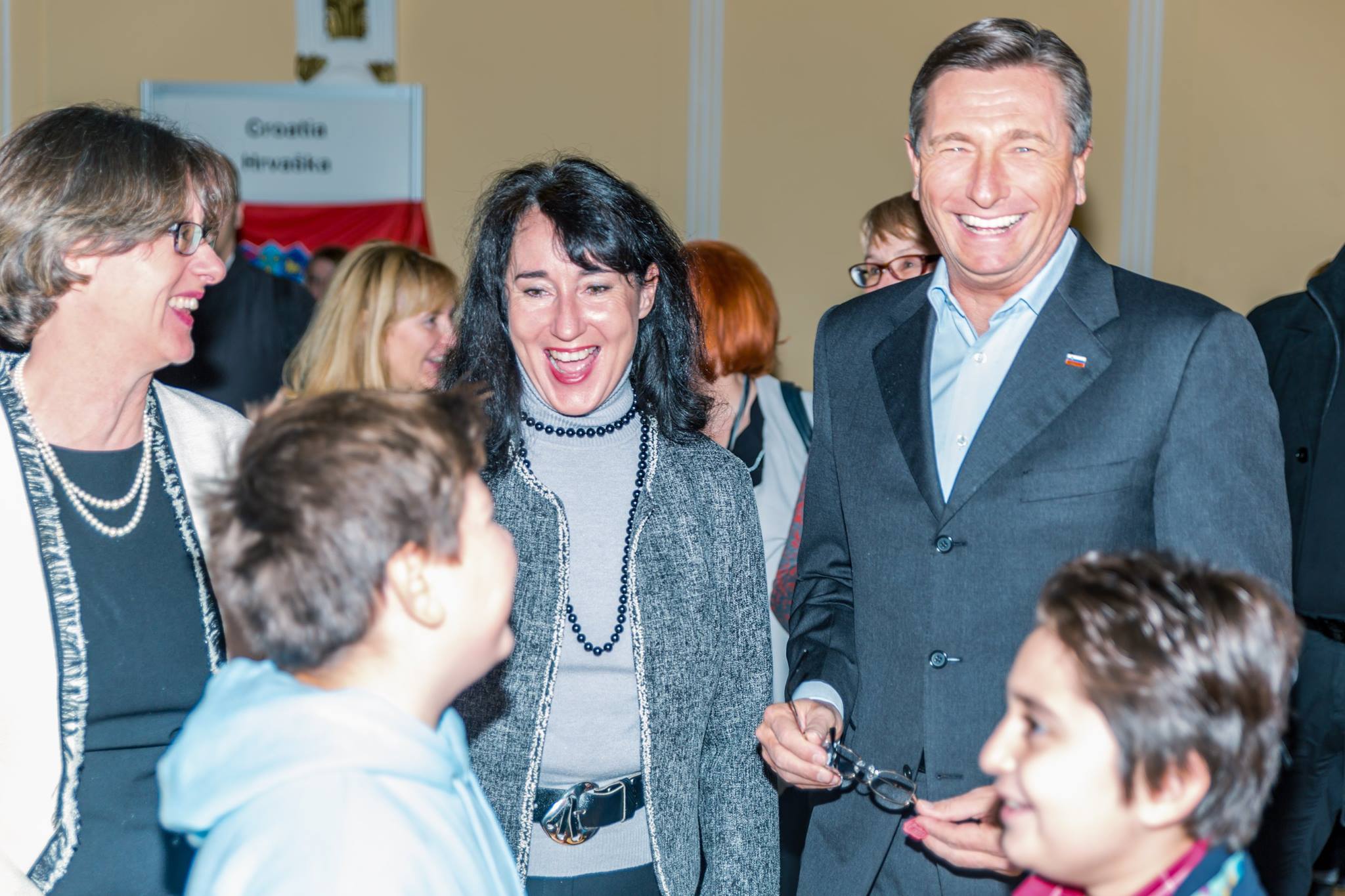
President Pahor at a previous bazaar. Photo: sila.si
Such work is the real focus of the bazaar, which raises money for charity. This year the targets are the elderly in different areas of the Slovenia, with the money raised from the event – including from a prize draw – being used to support projects sited in Jesenice, Novo Mesto, Krško, Slovenji Gradec and Ljubljana.
More specifically, the charities that any visitor to the bazaar will be supporting are:
Organisation ALTRA: Providing care, help and support for people with mental health problems and their relatives in Slovenia.
Ljudska Universa Jesenice and the project "Elderly for Elderly", supporting elderly people on low incomes.
The purchase of therapeutic devices for a home for persons with severe mental disorders in Novo Mesto
ASPI: An organization for adults with Asperger's syndrome and their parents.
School supplies for the children at Ljudska Univerza Krško.
MOCIS Slovenj Gradec, which needs furniture for a multi-generation centre.
Overall, SILA’s annual bazaar is a fantastic way to start the festive month, with food, music, colour, an international spirit and the opportunity to give back to, and be part of, the wider community in Slovenia, while celebrating differences and enjoying each other’s cultures. A highly recommended event, from 10:00 to 16:00 Sunday December 3, in the ballroom of the Grand Hotel Union (the entrance on Nazorjeva Ulica, next to the Atelje restaurant).
STA, 27 November 2018 - Successful Slovenian businessmen frequently get the feeling that politicians and municipal representatives expect gifts or high-value rewards in exchange for conducting business, according to a survey by Deloitte Slovenija.
All in all, 72% of the respondents assessed the business environment as moderately corrupt, with only a tenth saying corruption is low, the head of Deloitte forensics for the Adriatic region Yuri Sidorovich told the press on Tuesday.
In recent years there have been no substantial efforts to tackle graft. "The question is not how much corruption there is in a country, it is what the state is doing about it," he said.
Problems seen with public projects, judiciary and law enforcement
He summed up the results by saying that Slovenians are disproportionately honest, but they are also disproportionately tolerant to those who steal.
Deloitte set out to poll successful businessmen, including the wealthiest Slovenians and members of management and supervisory boards.
It received only 53 completed surveys. "Many responded, but they did not want to participate because of questions regarding anonymity," said Deloitte manager Aleš Berham.
More than one in three said that public projects are overpriced because of corruption, and almost half said they did not trust Slovenian judiciary and law enforcement when it comes to white collar crime.
Sidorovich said that not a single respondent fully trusted law enforcement. "Is it normal that people with access to information, who know what is going on in the financial world do not trust law enforcement?," he wondered.
STA, 27 November 2018 - The strike announced for 5 December seems increasingly unlikely after a number of public sector trade unions and the government initialled on Tuesday an agreement stipulating pay hikes for public sector employees. The deal is yet to be approved by the bodies of the 19 individual unions represented by negotiator Jakob Počivavšek.
The unions are expected to make a decision about the agreement, which will be the same for all of them, within a few days.
The chief government negotiator, Peter Pogačar, believes that the strike agreement could be signed early next week.
He thanked the strike committees, appointed after a number of public and private sector unions said they would go strike in early December, for "fair but also tough negotiations".
Počivavšek said today that the unions he represented found it key that all public sector employees would see their salaries increase.
He also underlined the importance of having reached a promise from the government to ensure funding sources for the pay increase.
This comes after the SVIZ union of teachers and two healthcare unions initialled a deal with the government last week. Getting the majority of unions on board is essential for the agreement to become valid for the entire public sector.
The deal will see pay rises and bonuses for working on Sundays and holidays
Pogačar believes that the agreement is a good omen for future cooperation and commended Počivavšek for doing a good job in coordinating and representing the strike committees of 19 unions.
Počivavšek thanked the government negotiators and expressed satisfaction that the unions, representing different activities and interests had a common position and followed the principles of equality and solidarity.
He said that there was however a bitter aftertaste "that the strike agreements that had been initialled earlier followed some other principles".
Počivavšek said that the sides also agreed to go over the system of promotions in the public sector next year to see whether there are unjustified differences between different occupations.
The deal initialled today entails a pay hike, increases of some bonuses such as those for work on Sundays and holidays. The agreement is to introduce a bonus for 40 years of service and raise pension severance from two to three salaries.
The unions represented by Počivavšek represent veterinarians, customs officers, public administration clerks, social services employees, as well as health care, as well as two soldiers' unions that are not allowed to go on strike.
STA, 27 November 2018 - Matjaž Kek has been appointed the new head coach of the Slovenian national football team, the Slovenian Football Association (NZS) announced on Tuesday. The 57-year-old returns to the helm of the national team after a successful stint in 2007-2011, when he led Slovenia to their last major competition, the 2010 World Cup.
The NZS said at a press conference in Brdo pri Kranju that Kek would coach the team in the qualifiers for the 2020 Euro and for the 2022 World Cup, and at the World Cup, if he managed to take Slovenia to the tournament in Qatar.
"It is an honour and a pleasure to be entrusted the position of the national team head coach. It is a great motivation and a huge challenge at the same time," Kek told the press, adding he was back to do something good for Slovenian football.
"If the situation was ideal, I wouldn't be here. But let's look into the future, as we have potential, including in the young selections. The main task will be to put it all together and produce good results," he added.
NZS president Radenko Mijatović said that Kek was exactly what the Slovenian team needed at the moment, adding that he would have the full backing of the football federation.
The Maribor native is replacing Igor Benedejčič, who lead the team in the last two matches in the UEFA Nations League as interim coach following the dismissal of Tomaž Kavčič in mid-October.
Kek will be under some pressure to take the team back on track after a dismal performance in the new international competitions replacing friendly matches and serving in part as qualifiers for the 2020 Euro.
Slovenia failed to score a single win in League C, the third tier in the competition, and was relegated to the lowest-ranking League D, with the unconvincing play and some players having problems with loyalty to the team were calling for change.
Kek also saw success in Croatia
A large part of the public had wanted Kek to take over after he had successfully managed the Croatian club Rijeka, taking the club to their first ever Croatian championship title in 2017, and finishing as runners-up in 2014, 2015 and 2016.
After Kek recently parted ways with Rijeka after five and a half years, he emerged as a logical candidate to replace Kavčič, who struggled to make order in the team which had also faced a number of injuries and cancellations by key players.
A son of a football player, Kek started playing for Maribor in 1979, and later played in Austria's Spittal and GAK. He returned to his native town in 1995 to play another four seasons for Maribor, winning two national championships and two league cups.
After returning at 38, he studied football coaching in Maribor and soon replaced Bojan Prašnikar at the helm of the Slovenian perennial champions. He took Maribor to two national championships and a national cup win in the 2002-2004 period.
Before signing with Rijeka, he also briefly coached Al-Ittihad of Jeddah, Saudi Arabia in the 2011-2012 season.
Kek joined the national team in 2006 as the head coach of the U-16 team, and in the following year succeeded Brane Oblak as the coach of the senior team, leading Slovenia in 49 matches to score 20 wins, nine draws and 20 losses.
Under Kek, Slovenia reached their highest FIFA ranking ever, at 15th in the autumn of 2010. He is the only Slovenian coach apart from Srečko Katanec to take Slovenia to a major competition (Euro or World Cup).
Kek and Katanec also hold the distinction of being the only individuals to both play for and coach the national team, with the former having his only cap for Slovenia in November 1992 at a friendly match with Cyprus.
Below is a review of today’s news in Slovenia, summarised by the headlines in the daily newspapers for Wednesday, November 28, 2018, as prepared by the STA:
DELO
New Armed Forces boss
"She's doing little talking, dives straight into hard work": Major General Alenka Ermenc secures a special place for herself and Slovenia in history by becoming the first army chief of staff in a NATO member country. (front page, 3)
State infrastructure
"What's the situation with key infrastructure projects?": The paper runs an interview with Infrastructure Minister Alenka Bratušek, who argues for a countercyclical approach when it comes to the timing of infrastructure investments. (front page, 10)
DNEVNIK
Social transfers
"December bringing relief or new problems?": With the system for extending rights such as child benefits and state scholarships switching to automatic mode, some fear the already long delays will get even longer. (front page, 3)
National football team
"Matjaž Kek takes over national team": Matjaž Kek returns to the hottest seat in Slovenian sport after seven years. (front page, 17-18)
Local election
"Poll gives better chances to Dragar in Domžale": The paper highlights a poll indicating incumbent Domžale Mayor Toni Dragar will win Sunday's run-off in Domžale. In Maribor former Mayor Franc Kangler is 1.6 points ahead of the political novice Saša Arsenovič. (front page, 9, 10)
FINANCE
Car industry
"Auto industry turning on its head": General Motors announces restructuring. Why are car makers choosing a direction that probably means they will sell less? (front page, 2-3)
Wealthy Slovenians
"Is you neighbour among the richest Slovenians? Five municipalities with the largest number of wealthy people": Ljubljana, Škofja Loka, Idrija, Celje and Kranj are the five Slovenian municipalities with the largest number of multimillionaires in Slovenia. (front page, 4-5)
Bitcoin
"Bitcoin: obviously not a store of value and even less so a payment instrument": The paper feature a commentary arguing bitcoin has failed to live up to expectations. (front page, 9)
VEČER
Loan corruption scandal
"Bribes for loans": Five bankers, a notary and several entrepreneurs are suspected of corruption related to the awarding of loans. (front page, 20, 21)
National football team
"Kek is back!": Matjaž Kek returns to the helm of the Slovenian national football team. (front page, 22)
Maribor local election
"Poll shows Kangler and Arsenovič neck and neck, few undecided voters": The latest poll by Večer indicates a very close mayoral run-off between former Mayor Franc Kangler and the political novice Saša Arsenovič, with Kangler 1.6 points ahead. (front page, 5)


